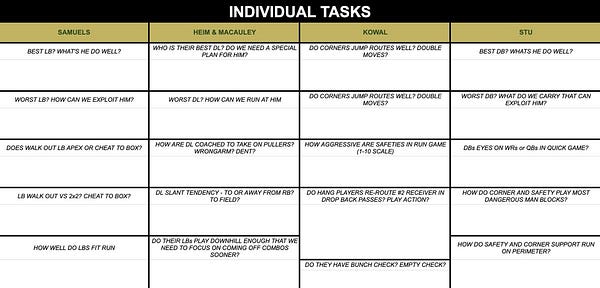Welcome to learning to teach, a weekly newsletter where I explore different strategies and topics to help us all become better teachers of the game of football.
My biggest need as a coach is to better my ability to communicate. In other words, I need to become a better teacher. The internet is full of knowledge, but you’ve got to be able to absorb it and then communicate it. I hope this newsletter can help you do just that — so if you aren’t subscribed, you can do so below.
I — and I’m sure you too — have frequently experienced this thought before and I was reminded of it today by writer Shane Parrish:
Most information is irrelevant.
Knowing what to ignore saves you time, reduces stress, and improves your decision making.
And there’s no doubt about it — we all spend too much time doing things that don’t matter and don’t spend enough time on doing the things that matter.
But this isn’t the worst thing in the world.
In fact, you could argue that it is only by doing the things that don’t matter that you can realize what matters.
In other words, the presence of the irrelevant exists to shine a light on the relevant.
And that’s like anything you create: you have to sludge through the trash you create for most of the journey because that’s the only way you get to the gold.
I recently learned this idea from a coworker as the 90% rule: 90% of what you’ll produce is going to be bad, but that’s the only way you’ll get to the 10% of good.
So, all that to say this: efficiency is a good thing and worth the pursuit, but it is not the goal itself. The goal itself is whatever you are trying to accomplish. And if you haven’t accomplished what you are trying to accomplish, then the time you spend on achieving efficiency might be better spent on building what you need to build.
How this relates to football: opponent breakdowns and game planning
When you are breaking down an opponent, there is a lot of trash to dig through.
When you are building a game plan, there are a lot of things that you could do.
That’s why you must have extreme focus when you spend your time game planning on the weekend.
Coach Doug Samuels (@CoachSamz) shared a great framework of questions that focuses your efforts on what matters:



As a young coach who hasn’t broken down hundreds of games yet to acquire the experience to know what to look for, I need to learn from those who have to learn what matters and what doesn’t. I remember when I first started coaching, I was often overwhelmed when watching film. I would try to look at every single thing when watching film (and maybe that’s a good thing — remember the 90% rule).
Now that might be a good thing because without going through the process of looking at what doesn’t matter a lot, I might not truly understand why something doesn’t matter. And that’s because the best way to learn is to do.
So without further ado, here are the opponent breakdown templates that Coach Samuel and staff use:
Macro Level
Here’s what Coach Samuels’ staff analyzes the defense from a big picture perspective:
My favorite question is “How do we win this game?”
What a simple question. But it certainly gets straight to the point and it’s worth asking and thinking about long and hard every week.
What does winning this game look like?
Now we’ve asked this in our own meetings, but it’s never been a consistent question that we all think about separately and then come together to compare.
Micro Level
They then break down the defense by asking questions at the positional level:
Once again, simple questions that are focused on the things that matter.
Football is a game of leverage and matchups, so if you don’t have a great idea about who the other team’s personnel is, then you’ll be blind.
Final thoughts
The whole purpose of my writing to you is to help you (and me) focus on what matters and abandon all else.
I have spent a lot of time learning about things that don’t matter and I hope to help you not do the same by bringing to light great football resources and strategies to help everyone become better teachers of the game of football.
As we launch into this fall season, I will be focusing on honing in on breaking down opponents, game planning and self-scouting.
All three of those topics consist of a lot of data that you must ruthlessly filter through to find the gold.
If you’re interested in keeping up with the journey through the trash to find the gold:
Until next time —
Emory
Other Reading:
The story of one man’s ideas that changed how you think about the game





